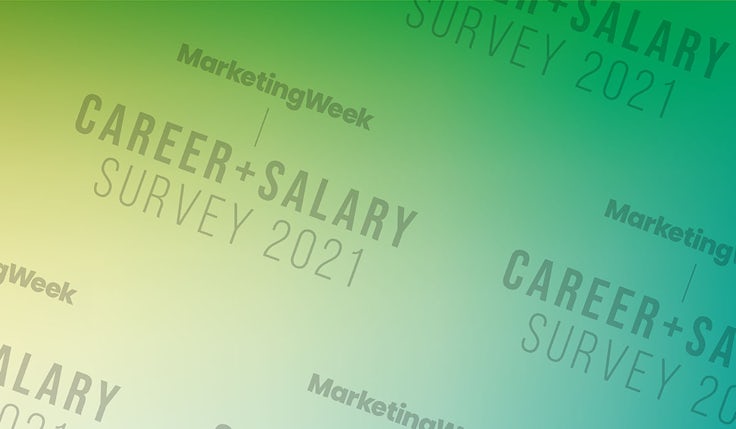Marketing salaries jump ‘by as much as 50%’ as job market bounces back
There are now more marketing roles available than candidates to fill them, which is pushing salaries up and creating a “war for talent”.
 After suffering through the Covid-19 crisis amid budget cuts, the job market for marketers has begun to bounce back, such that many executive search agencies and recruiters are juggling more roles than candidates.
After suffering through the Covid-19 crisis amid budget cuts, the job market for marketers has begun to bounce back, such that many executive search agencies and recruiters are juggling more roles than candidates.
As a result, salaries across many categories have increased beyond pre-pandemic levels, particularly at the senior level.
“Salaries have suddenly got to the same level as pre-pandemic and then exceeded that,” says executive search firm Grace Blue’s managing partner and head of consumer, David Nobbs.
“Organisations are willing to spend £20,000 or £50,000 more to get someone outstanding for an opportunity, because they know that person could add tenfold if they come onboard and succeed.”
Indeed, with businesses also having to compete hard to retain existing talent, Nobbs tells Marketing Week that it is “not uncommon” to hear of organisations offering a 50% or more pay increase to senior talent to stay in their current role.
“Loads of employers are really trying to retain top talent because it’s a massive cost and disaster if your star performer leaves,” he says. “It’s got quite silly in terms of how much people are getting paid to stay doing their current job.”
[The pandemic] had a massive impact [on marketers], but things have been bouncing back quite aggressively and there is a real war for talent.
David Nobbs, Grace Blue
Leadership search firm Fortune Hill confirms it has seen a similar trend of rising salaries and increased counter offers, as have recruitment agencies Kindred, Michael Page, EMR and Hays.
According to research by Hays, close to a quarter (23%) of employers hiring marketing professionals say they are more likely to offer staff a counter offer now compared to pre-pandemic, while Kindred director Katie Jackson brands the job market “an almost unrecognisable marketplace from 12 months ago”.
However, while Fortune Hill’s associate director John Hunter suggests executive salaries are “definitely going up” compared to pre-pandemic levels, he’s doubtful it reaches as much as a 50% increase. Instead, he says he has seen senior marketing operators invited to participate in share schemes or company long-term incentive plans (LTIPs) “to a level we haven’t seen before”.
Revealed: The cost of Covid on marketing careers
“Many organisations feel this is the only way to ensure they can retain [staff] within this in-demand population,” he says. “Locking them in and making sure it’s impossible for the very best to leave.”
In particular, the agency is seeing this with its tech and FTSE clients, Hunter says, which are increasing their share offerings and restructuring their packages to try and be more competitive.
“Bear in mind these organisations have asked their top table to take pay cuts over the pandemic. So they’re trying to redress that and keep people motivated, engaged and onside,” he explains.
It’s a similar story at the more junior end of the market, according to EMR’s managing director Anna Jacobs.
“We are definitely experiencing a rise in salaries – notable at the junior end of the market at the moment. This is welcomed as most salaries in marketing have remained stagnant for years,” she says.
“Candidates are generally cautious as we’re not out of the pandemic yet. And many are now enjoying new ways of working and saving money on commuting, so prising potential candidates out of comfortable roles is harder.
“This means the traditional salary increase of 5-10% isn’t as attractive as it once was, and they expect a significant uplift to compensate for the risk involved in changing roles.”
On the other hand, some candidates are leaving their roles as they didn’t receive bonuses last year, or their pay hasn’t returned to pre-pandemic levels, Jacobs adds, and as such are seeking significant increases.
A candidate’s market
According to all agencies, salary increases are being driven by the rising competitiveness in the market from the perspective of employers, with more jobs available than talent on the whole.
“[The pandemic] had a massive impact [on marketers], but things have been bouncing back quite aggressively and there is a real war for talent,” says Grace Blue’s Nobbs.
At the senior end of the spectrum, Nobbs says candidates who have been headhunted by Grace Blue typically have a lot more opportunities to consider than previously. They are now considering four to five opportunities concurrently, he says, an increase of 50% on pre-pandemic levels.
“The job market is much more competitive, but that’s employers competing for top talent and not just candidates competing for opportunities,” he says. Candidates are therefore in a much better position to negotiate remuneration than before.
“It really is a candidate marketplace,” he adds. “They can pick and choose opportunity.”
Fortune Hill’s Hunter has also witnessed a “noticeable rise” in the re-recruiting of C-suite marketing talent over the past six months, after many CMOs departed their roles during the pandemic and were replaced by more junior talent, such as marketing directors, to keep costs down.
Brands have realised those businesses that invested in marketing during the pandemic have largely come out on top, Hunter explains. “This has prompted a lot of organisations to now prioritise marketing after resolving the operational, technological and structural challenges the pandemic forced them to address.
“I think this trend will likely continue into the new year,” he adds. “If they brought in a more junior person to steady the ship last year, they are now looking for a more senior person to really push the brand forward.”
On the candidate side, Nobbs predicts a “great resignation” incoming, where senior marketers who have had time to reflect over the past 18 months leave their roles, having reconsidered what they want from a position.
However, Hunter expects uncertainty during the winter months around the possibility of another lockdown will make job security more important to many senior marketers, therefore meaning competition may get even hotter.
Ready-made marketers
Meanwhile, Kindred’s Jackson says at the mid to senior level, a large proportion of clients are placing a focus on “ready-made” candidates with experience, which is generating “increased pressure” on this talent pool. This is occurring “most notably” in the digital marketing and social media space, she says.
Social experts and digital specialists: The state of the marketing jobs market
Ball and Hoolahan’s senior consultant Danielle Lavin claims to have seen a similar trend, with more clients looking for candidates “who can do it all”.
As a result, employers are having to carefully consider salary levels if they want to hire the right talent quickly. “Where salaries are less competitive, recruitment is taking much longer than usual,” Jackson says.
Similarly, Hunter suggests organisations with less digital acumen than others are struggling to hire because they’re hoping to bring in the top digital talent.
“We’re doing a search at the moment for a very well-known business which isn’t the most digitally native organisation, but they really want top digital talent,” he says. “You have to work twice as hard in these situations because typically, the very top digital talent wants to work for top digital businesses.”
In these cases, he says organisations have been offering “slightly inflated salaries in order to secure those people and lock them in”.
As for whether the increase in salaries will be sustained moving forward, Hunter says he is unsure, though wouldn’t be surprised if it does stick as these things “usually do”. “It’s very hard to move backwards on that,” he adds.







